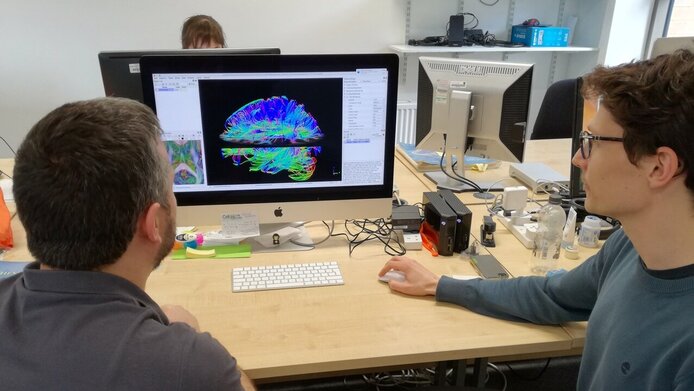Oxford – venerable and cutting-edge

As a trained psychologist I am interested in finding out exactly how human beings think, or, more precisely, how the brain processes information. I am particularly intrigued by the question as to what enables people to successfully assess the thoughts and intentions of others; a field of study known by scientists as Theory of Mind. The fact that this “social intelligence” is relevant in daily life becomes obvious in the case of psychological deficits, such as autism spectrum disorders, alexithymia (also known as emotional blindness), and certain personality disorders. Today, it is known that these disorders always include alterations in brain structure and brain function.
The fingerprint of social intelligence
My current research focus lies in identifying the “connectional fingerprint” of social intelligence in the brain by means of magnetic resonance tomography (MRT). This involves finding the connectivity patterns (fibre bundles) between brain areas that determine an individual’s ability to be socially cognisant. In the future this may help to better understand disorders based on deviations from these interconnections. Such knowledge is also important, given that it has been repeatedly demonstrated that the acquisition of new behaviour produces a “rewiring” in the brain.
Departing for new shores
In my field of research, international exchange is an absolute necessity. After acquiring my PhD in Salzburg and spending my first post-doc years there, the time was right for me to go abroad. I am happy now that I was brave enough to apply for a position at Oxford. The idea was born when I received a pointer in an anonymous opinion on one of my articles. I still don’t know who gave me this tip, but I am truly grateful for it! Of course, the fact that Oxford is one of the world’s most renowned universities made my decision easier.
Oxford University – a melting pot of cultures
At Oxford University, scientists find themselves working in an extremely encouraging environment. My research group includes more than 20 people. Many of them have already studied and/or worked at internationally renowned universities in London, Paris, Berlin, Tokyo and Nijmegen (NL). This makes for not only an enormous pool of expertise, but also for a very inspiring cultural mix. Such an international group of collaborators quickly develops into a large network of colleagues that will endure long after the fellowship period has ended.
Staying in touch
The journey from Oxford to Salzburg via London is surprisingly short and enables me to visit my home regularly and also stay in touch with my Austrian colleagues. In Salzburg I was lucky enough to have a brilliant mentor in Josef Perner. The Cognitive Neuroscience Centre at the University of Salzburg has grown rapidly over the past few years and today enjoys international visibility as a research unit. Reason enough for me to look forward to taking up research again at my home university during my return phase.
Arriving in Oxford – the gentle way
As a side note, I can confirm that the legendary English civility definitely exists. At the beginning you are treated with leniency and receive acknowledgement rather than criticism. Moreover, Oxford is a wonderful town with a high quality of life, a lot of greenery and a very diverse offer of cultural activities. It is also unfortunately true that housing is in short supply and really expensive.
Thank you for the Schrödinger Fellowship
I know with absolute certainty that I wouldn’t want to miss my time in Oxford for the world and that the Erwin Schrödinger Fellowship provides a ground-breaking and inspirational experience. I am deeply indebted to the FWF for providing me with this possibility. And I can definitely recommend Oxford!





